MercoPress. South Atlantic News Agency
Economy
-
Wednesday, November 28th 2018 - 08:41 UTC
Trump open to a deal with China on certain conditions, says advisor Kudlow

U.S. President Donald Trump is open to reaching a deal on U.S.-China trade irritants over dinner on Saturday with Chinese leader Xi Jinping but is ready to hike tariffs on Chinese imports if there is no breakthrough, White House economic adviser Larry Kudlow said on Tuesday.
-
Wednesday, November 28th 2018 - 08:26 UTC
Buenos Aires sealed off for G20; anarchists and anti capitalists pledge to stage protests
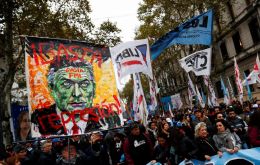
Argentine authorities say that Buenos Aires will be an armored city when world leaders arrive for this week's G-20 summit. But security failures that marred a football championship and deeper unrest over an economic austerity program are raising concerns about the country's ability to ensure safety.
-
Tuesday, November 27th 2018 - 15:18 UTC
Sharp fall in Brazil's Petrobras fuel but not so fast at pumps

The average price of gasoline at Petrobras' refineries has dropped around 20% in November as of Tuesday but that decrease will not hit retail prices anytime soon. The state-run petroleum company made the announcement Monday, but gas stations were reluctant to follow suit, at least not at the same level.
-
Tuesday, November 27th 2018 - 09:51 UTC
Bad start for Bolsonaro: Temer signs 16% pay raise for Justices, which is a benchmark for other public sector
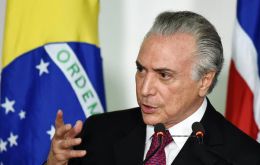
Brazil’s exiting President Michel Temer signed into law a 16% pay raise for Supreme Court justices on Monday, disregarding a request from his President-elect Jair Bolsonaro that he veto the bill to avoid increasing next year’s budget deficit.
-
Tuesday, November 27th 2018 - 09:27 UTC
IMF praises Argentina's reforms program and anticipates rebound of activity in 2019
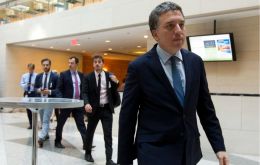
The International Monetary Fund has completed its second review of Argentina, the fund said on Monday, paving the way for the country to receive US$7.6 billion under a US$ 56.3 billion financing deal.
-
Tuesday, November 27th 2018 - 09:00 UTC
Brazil Eyes US$ 30 Billion Offshore Oil Boom
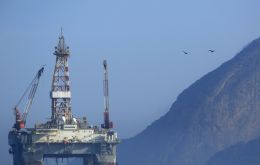
Over the past few years, Brazil has held several very successful oil auctions under production-sharing contracts in its pre-salt layer, attracting major oil companies to its prized offshore oil area.
-
Tuesday, November 27th 2018 - 08:59 UTC
US and Argentina ready to sign a two-way fresh beef deal

Argentina is on the verge of signing a deal with the United States that would allow two-way trade of fresh beef for the first time in nearly two decades, the country's international trade secretary, Marisa Bircher, said. The agreement, expected to be signed within days, would simultaneously open beef imports to both countries, Bircher told Reuters in an interview.
-
Tuesday, November 27th 2018 - 08:51 UTC
Trump downplays a trade deal with China ahead of Saturday's meeting with Xi in Buenos Aires

United States president Donald Trump and Chinese leader Xi Jinping will meet on Saturday in Argentina on the sidelines of a Group of 20 summit in Buenos Aires, a U.S. media outlet reported on Monday. The two leaders will meet a day after the United States, Mexico and Canada sign a new trilateral trade agreement, the online edition of Inside U.S. Trade said.
-
Tuesday, November 27th 2018 - 08:47 UTC
Trump not happy with GM's decision to cut 14.000 jobs and close several plants

President Donald Trump does not like the news that General Motors would close several plants and cut more some 14,000 jobs. Speaking to reporters on the White House lawn on Monday afternoon, Trump said he spoke with CEO Mary Barra and told her he wasn't happy with the decision. “I told her I'm not happy about it,” Trump told reporters.
-
Tuesday, November 27th 2018 - 08:44 UTC
Italy confirms its high spending budget to “end poverty” and defies EU rules
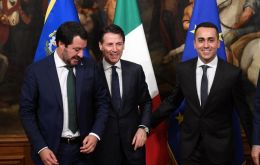
Italy's government says it will stick to its high-spending budget plans, setting up a potential stand-off with the European Union over its deficit. PM Giuseppe Conte, who held talks with deputies Matteo Salvini and Luigi Di Maio on Monday, said the objectives for 2019 had already been fixed.
